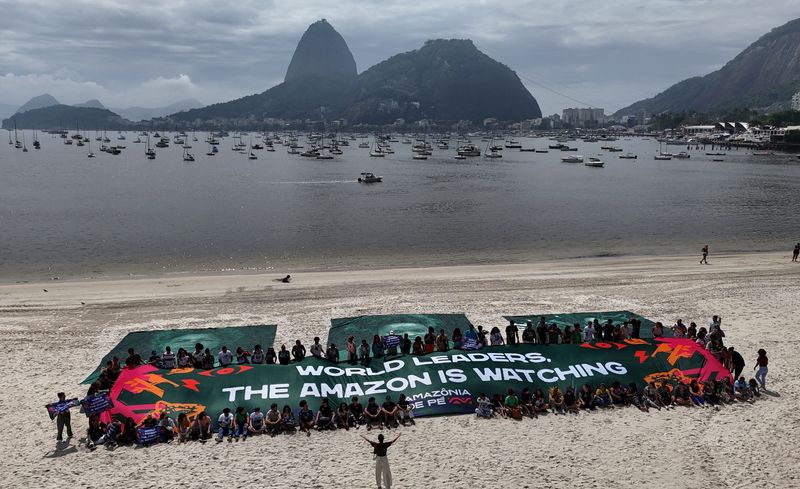By Jake Spring and Lisandra Paraguassu
RIO DE JANEIRO (Reuters) -Diplomatic tensions over global warming spilled over into G20 summit talks in Brazil this week, with sources saying the 20 major economies had reached a fragile consensus on climate finance that will lead to U.N. talks in Azerbaijan had escaped.
Heads of state arrived in Rio de Janeiro on Sunday for the G20 summit and will discuss issues ranging from poverty and hunger to reforming global institutions on Monday and Tuesday. The talks must now also grapple with how to tackle escalating violence in Ukraine following a deadly Russian airstrike on Sunday.
Yet ongoing UN climate talks have put a spotlight on their efforts to tackle global warming.
While the COP29 summit in Baku, Azerbaijan, is tasked with agreeing a goal to mobilize hundreds of billions of dollars for climate, leaders of the Group of 20 major economies, half a world away in Rio, hold the reins in hands.
The G20 countries account for 85% of the global economy and are the largest contributors to multilateral development banks that help direct climate finance.
“The spotlight is of course on the G20. They are responsible for 80 percent of global emissions,” UN Secretary-General Antonio Guterres told reporters in Rio de Janeiro. He expressed concern about the state of the COP29 talks in Baku and called on G20 leaders to do more to combat climate change.
“Now is the time for leadership by setting an example for the world’s largest economies and emitters,” Guterres said.
UN climate chief Simon Stiell wrote a letter to G20 leaders on Saturday imploring them to take action on climate finance, including boosting subsidies for developing countries and promoting reforms of multilateral development banks.
However, the same fighting that has plagued COP29 since the start of last week has become crucial to the G20 negotiations, according to diplomats close to the Rio talks.
COP29 should set a new target for the amount of financing to be sent from developed countries, multilateral banks and the private sector to developing countries. Economists told the summit that this should be at least $1 trillion.
Rich countries, especially in Europe, have said that an ambitious target can only be agreed upon if they expand their contributor base to include some of the wealthier developing countries, such as China and major Middle Eastern oil producers.
On Saturday, discussions over a G20 joint statement in Rio on the same issue stalled, with European countries pushing for more countries to contribute and developing countries such as Brazil pulling out, diplomats close to the talks told Reuters.
But early Sunday morning, negotiators agreed to a text that mentioned developing countries’ voluntary contributions to climate finance, without naming those obligations, two diplomats said.
The breakthrough remains overshadowed by the return to power of newly elected US President Donald Trump, who is reportedly preparing to withdraw the United States from the Paris climate agreement again. His election casts doubt on how much money the world can raise to tackle climate change, possibly without the support of the world’s largest economy.
Trump plans to roll back landmark climate legislation passed by outgoing President Joe Biden, who visited the Amazon rainforest (NASDAQ:) when he stopped there on Sunday on his way to Rio.
The success of not only COP29, but also the next UN climate summit, COP30 next year in Brazil, depends on an ambitious agreement on climate finance.
A central part of Brazil’s COP30 strategy is ‘Mission 1.5’, an effort to keep alive the Paris Climate Agreement’s goal of limiting global warming to 1.5 degrees Celsius. The UN estimates that current national targets will cause temperatures to rise by at least 2.6 degrees Celsius.

Developing countries argue that they can only increase their emissions reduction targets if rich countries, which are the main culprits of climate change, foot the bill.
“It is technically possible to reach the 1.5 degrees Celsius target, but only if a G20-led, massive mobilization to reduce all greenhouse gas emissions is achieved,” Bahamas Prime Minister Philip Davis said at COP29 last week .


